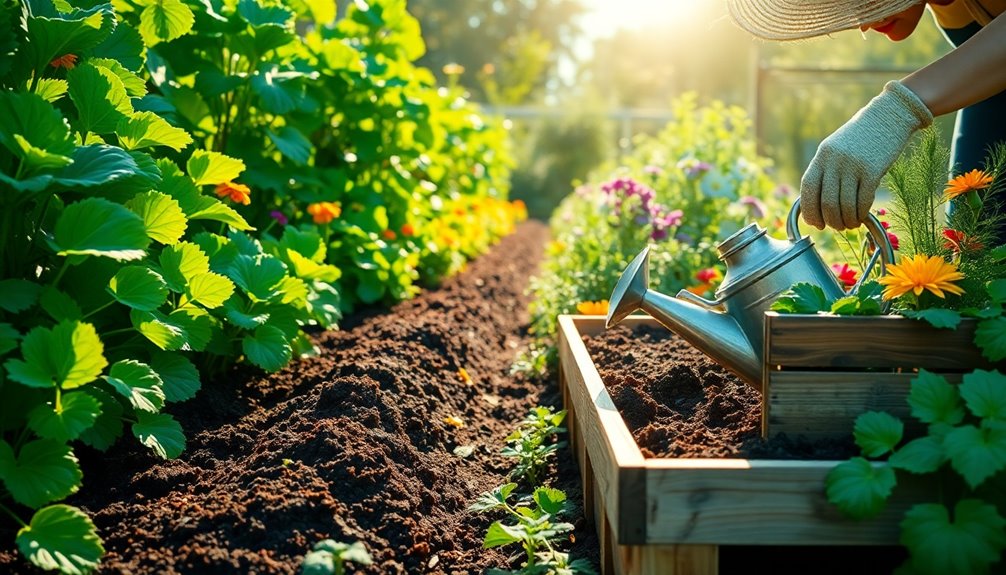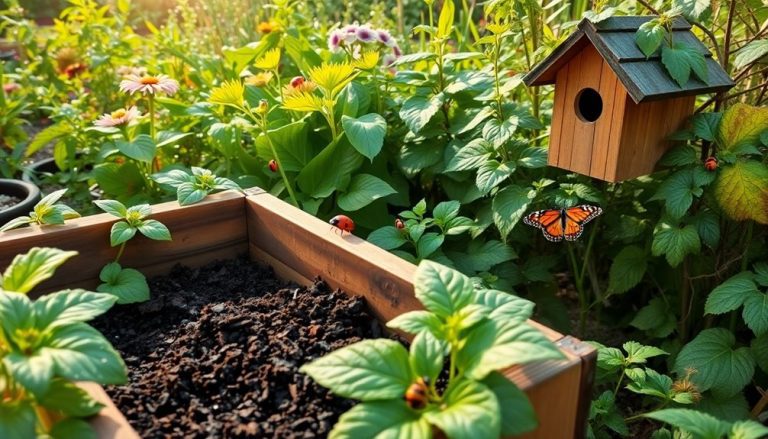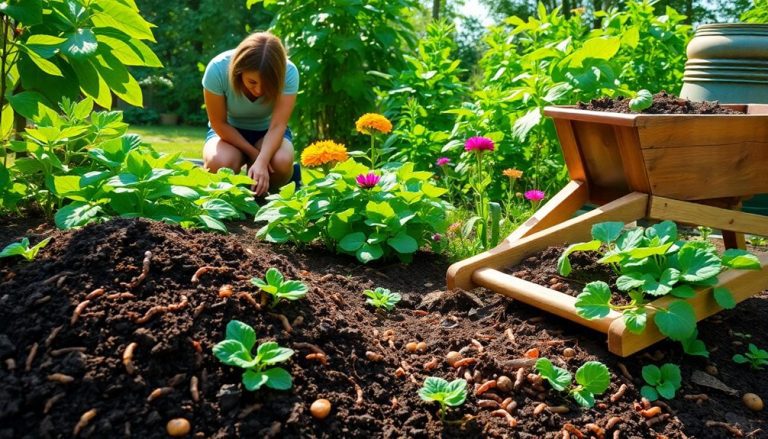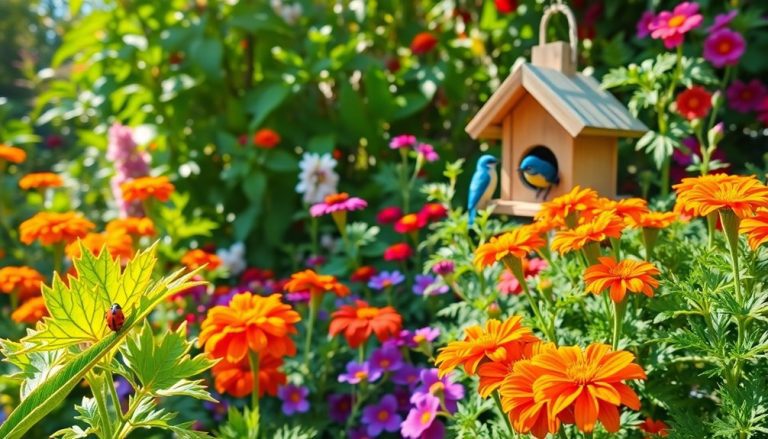To start your organic gardening journey, focus on these five techniques. First, choose the right soil by amending it with compost for nutrients. Next, practice companion planting to boost growth and deter pests naturally. Implement natural pest control by attracting beneficial insects and using homemade remedies. Then, enrich your garden with organic fertilizers like compost or well-aged manure for healthy plants. Finally, adopt sustainable watering practices, using soaker hoses and mulch to retain moisture. These strategies will set you up for success, and there's even more to discover to enhance your gardening skills.
Key Takeaways
- Start with healthy soil by enriching it with organic matter and testing pH for optimal vegetable growth.
- Implement companion planting to enhance flavors and deter pests naturally, such as pairing tomatoes with basil.
- Utilize natural pest control methods, like introducing beneficial insects and using neem oil to protect your plants.
- Fertilize organically using compost and well-aged manure to improve soil health and nutrient availability.
- Practice sustainable watering techniques, like using drip irrigation and mulching to retain moisture and reduce evaporation.
Choosing the Right Soil
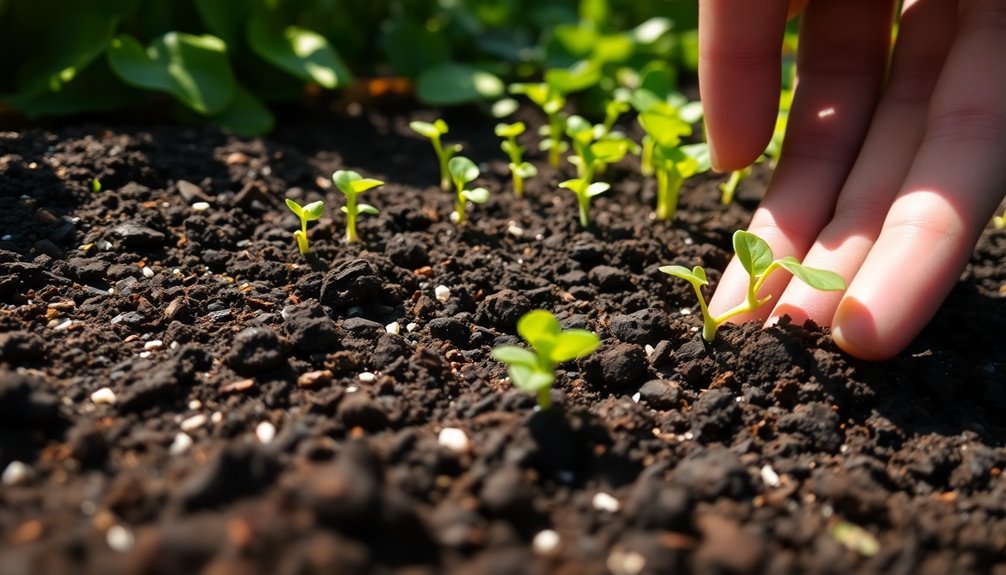
Choosing the right soil is crucial for successful organic gardening. Your plants rely on healthy soil to provide essential nutrients, support root growth, and retain moisture.
Start by assessing your existing soil. If it's too compacted or sandy, consider amending it with organic matter like compost or well-rotted manure. This not only improves soil structure but also boosts fertility.
Next, test your soil's pH level. Most vegetables thrive in a pH of 6.0 to 7.0. If your soil is too acidic or alkaline, you can adjust it using lime or sulfur, respectively. Remember, balanced soil promotes better nutrient uptake.
When selecting soil for raised beds or containers, go for organic potting mixes specifically designed for vegetables or herbs. Look for products that contain a blend of peat moss, compost, and perlite or vermiculite. This combination ensures good drainage while holding essential moisture.
Finally, don't forget to rotate your soil amendments each season. Different crops require various nutrients, so rotating helps maintain a balanced soil ecosystem.
With the right soil, you'll set a strong foundation for your organic garden, leading to healthy plants and bountiful harvests.
Companion Planting Strategies
When planning your organic garden, consider the benefits of companion planting. This technique involves pairing plants that support each other's growth, enhancing your garden's overall health and productivity.
By strategically choosing which plants to grow together, you can maximize space, improve yields, and create a more resilient ecosystem.
Here are some effective companion planting strategies to get you started:
- Tomatoes and Basil: Basil not only enhances the flavor of tomatoes but also deters pests like aphids.
- Carrots and Onions: These plants can help each other by masking their scents, making it harder for pests to locate them.
- Beans and Corn: Beans fix nitrogen in the soil, benefiting corn's growth, while corn provides support for the climbing beans.
- Marigolds and Vegetables: Planting marigolds can repel nematodes and other harmful insects, protecting your veggies.
Natural Pest Control Methods
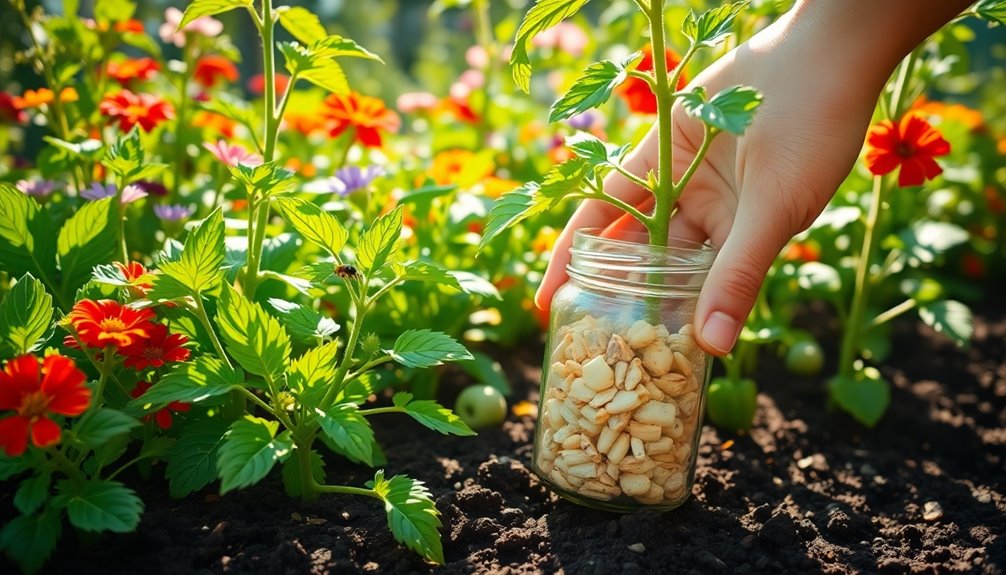
Pests can be a gardener's worst nightmare, but you don't have to resort to harsh chemicals to keep your plants healthy. One effective way to manage pests is to introduce beneficial insects, like ladybugs and lacewings, which naturally prey on harmful bugs. You can attract these allies by planting flowers such as marigolds or dill around your garden.
Another method is using homemade sprays. A simple mixture of water and dish soap can deter pests like aphids. Just mix a few drops of soap with water in a spray bottle and apply it directly to the affected plants. Neem oil is another natural option; it disrupts the life cycle of pests without harming beneficial insects when used correctly.
Physical barriers are also a smart choice. Row covers, for example, can prevent insects from reaching your plants while still allowing sunlight and moisture in.
Lastly, keeping your garden clean by removing debris and dead plants minimizes hiding spots for pests. By combining these natural pest control methods, you can create a thriving garden that's healthy and chemical-free!
Organic Fertilization Techniques
Fertilizers play a crucial role in organic gardening, providing essential nutrients that help your plants thrive.
Unlike synthetic fertilizers, organic options enhance soil health, encourage beneficial microorganisms, and promote sustainable growth.
Here are some effective organic fertilization techniques you can use:
- Compost: Create your own compost from kitchen scraps and yard waste. This enriches the soil with vital nutrients and improves its structure.
- Manure: Use well-aged animal manure to provide a rich source of nitrogen and other nutrients. Just ensure it's fully composted to avoid burning plants.
- Green Manures: Plant cover crops like clover or rye during the off-season. When tilled back into the soil, they add organic matter and improve fertility.
- Organic Meal Fertilizers: Consider using bone meal, blood meal, or fish emulsion. These options release nutrients slowly, feeding your plants over time.
Watering Practices for Sustainability
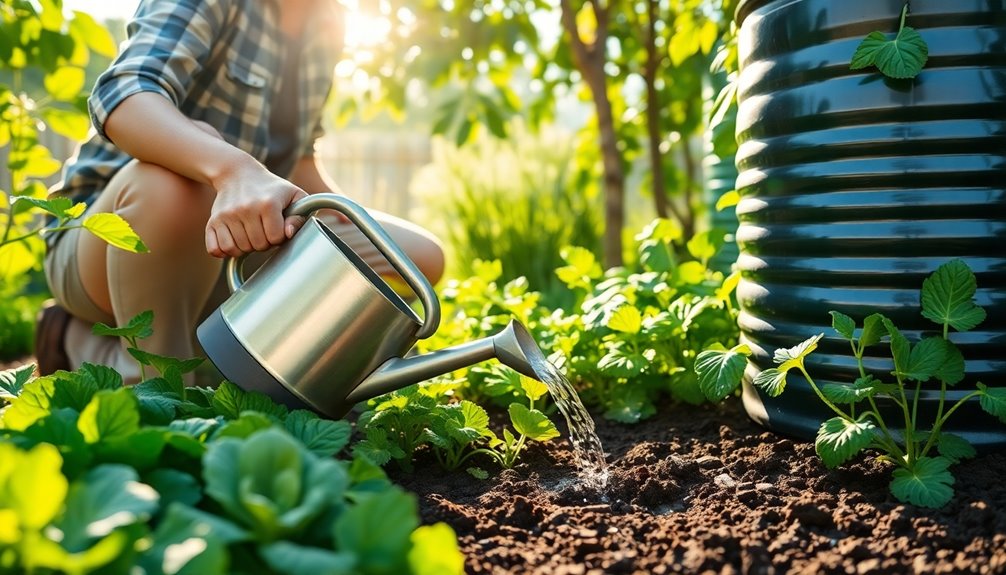
Effective watering practices are essential for sustainable organic gardening, as they ensure your plants receive the moisture they need without wasting water.
Start by watering early in the morning or late in the afternoon. This timing reduces evaporation and allows your plants to absorb moisture efficiently.
Use a soaker hose or drip irrigation system to deliver water directly to the roots. This method minimizes water loss and encourages deep root growth, which helps your plants thrive.
Be mindful of your soil type; sandy soils may require more frequent watering, while clay soils hold moisture longer.
To gauge when to water, check the top inch of soil. If it's dry, it's time to water. Instead of soaking the soil daily, aim for deeper, less frequent watering sessions. This encourages roots to grow deeper, making plants more resilient to drought.
Mulching your garden beds can also help retain soil moisture, reducing the need for frequent watering.
Lastly, collect rainwater using barrels to further promote sustainability. By implementing these practices, you'll not only nurture your plants but also conserve water for a healthier environment.
Frequently Asked Questions
What Tools Do I Need for Organic Gardening?
To cultivate your green oasis, you'll need essentials like a trowel, pruners, gloves, and a watering can. These tools help you nurture your plants while embracing the beauty of nature's gentle embrace in your garden.
How Can I Start Composting at Home?
To start composting at home, choose a bin or pile location, gather kitchen scraps and yard waste, and layer them. Turn the mixture regularly, and in months, you'll have rich compost for your garden!
What Are the Best Organic Seeds for Beginners?
When choosing organic seeds, you'll want to start with easy-to-grow varieties like lettuce, radishes, and beans. These seeds germinate quickly, thrive in various conditions, and provide you with a rewarding gardening experience.
How Do I Identify Healthy Plants?
To identify healthy plants, check for vibrant colors, firm leaves, and robust stems. Look for signs of pests or disease, like discoloration or wilting. Healthy plants should have strong growth patterns and an overall balanced appearance.
Can I Garden in Small Spaces Effectively?
Absolutely, you can garden in small spaces effectively! Use vertical gardening, container planting, and choose compact varieties. These methods maximize your area, allowing you to grow a variety of plants without needing a large plot.
Conclusion
By embracing these organic gardening techniques, you're not just cultivating plants; you're nurturing a vibrant ecosystem. Choosing the right soil, employing companion planting, utilizing natural pest control, and practicing sustainable watering will transform your garden into a flourishing haven. Remember, each seed you plant is a promise of growth, and with patience and care, you'll reap a bountiful harvest. So dig in, get your hands dirty, and watch your garden bloom like a canvas of nature's finest art!

